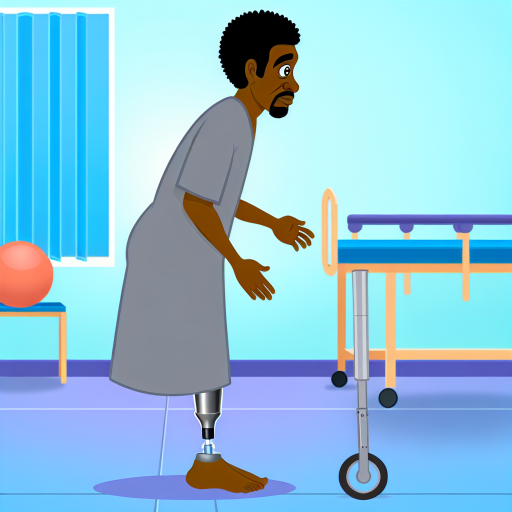Introduction
In Nigeria, mental health challenges are on the rise, affecting millions of individuals across the country.
The stigma attached to mental health issues often prevents people from seeking help or receiving proper care.
Therefore, there is a critical need for innovative mental health programs that can address these challenges effectively.
Overview of Current Mental Health Programs in Nigeria
Nigeria, like many other countries, faces challenges in addressing mental health issues.
The current mental health programs in the country encompass a mix of traditional and conventional methods.
While these programs have made some progress, there is a need for more effective and innovative solutions to cater to the growing mental health needs of the population.
Mention of Existing Traditional and Conventional Methods
One of the traditional methods used in Nigeria to address mental health issues is the involvement of spiritual healers and traditional medicine practitioners.
These individuals often play a significant role in helping people cope with mental health challenges by offering spiritual guidance and herbal remedies.
Additionally, conventional methods such as counseling and psychotherapy are also utilized in mental health programs across Nigeria.
These approaches are more aligned with modern mental health practices and are often used in conjunction with traditional methods to provide comprehensive care to individuals.
Challenges Faced by These Programs in Addressing Mental Health Issues
Despite the efforts made by existing mental health programs in Nigeria, there are several challenges they face in effectively addressing mental health issues.
One of the primary challenges is the stigma associated with mental health, which often prevents individuals from seeking help and accessing services.
Another challenge is the lack of trained mental health professionals and resources in the country.
Many regions in Nigeria have a limited number of mental health facilities and professionals, making it difficult to provide timely and adequate care to those in need.
Need for More Effective and Innovative Solutions
To address the challenges faced by current mental health programs in Nigeria, there is a clear need for more effective and innovative solutions.
One potential solution is the integration of technology into mental health care, such as teletherapy and online counseling services.
These platforms can help reach individuals in remote areas and provide them with access to mental health support.
Additionally, community-based mental health programs that involve community members in the identification and treatment of mental health issues can also be effective.
By engaging with local communities, these programs can help reduce stigma and increase awareness of mental health.
Case studies of successful innovative mental health programs
Description of successful mental health initiatives in Nigeria.
One of the most successful mental health programs in Nigeria is the Strong Minds initiative.
They provide group therapy sessions for women suffering from depression and other mental health issues.
The program has reached over 50,000 women and has seen significant improvements in their mental well-being.
Impact of these programs on individuals and communities
These programs have had a profound impact on individuals and communities in Nigeria.
Individuals have reported feeling more empowered and able to cope with their mental health challenges.
Communities have seen a decrease in stigma surrounding mental health and an increase in support for those struggling.
Lessons learned from these programs for future implementation
One key lesson learned is the importance of community involvement in mental health programs.
Engaging with community leaders and members helps to break down barriers and increase acceptance of mental health services.
Another lesson is the need for sustainable funding and resources for these programs to continue their success.
Learn More: Case Studies of Preventive Medicine Success in Nigeria
Benefits of innovative mental health programs
Access to mental health care services has been a significant challenge in many countries, including Nigeria.
Innovative mental health programs have helped improve this access by reaching individuals who may not have sought traditional services.
These programs utilize technology, community outreach, and alternative therapy methods to bridge the gap.
One of the key advantages of these innovative programs is the reduction in stigma associated with mental health issues.
By incorporating educational campaigns and destigmatization efforts into their initiatives, these programs work towards creating a more accepting and supportive environment for individuals facing mental health challenges.
This, in turn, encourages more people to seek help without the fear of judgment or discrimination.
Furthermore, innovative mental health programs focus on enhancing the overall wellbeing and productivity of individuals.
Through a holistic approach that addresses not only the symptoms but also the underlying causes of mental health issues, these programs aim to empower individuals to lead fulfilling lives.
By providing support, resources, and personalized care, they help individuals build resilience, cope effectively with stress, and achieve their full potential.
The benefits of innovative mental health programs extend beyond just the individual level.
Transform Your Career with Expert Guidance
Get personalized mentorship consulting that’s tailored to your unique path. Our expert advice is actionable and exclusive.
Get StartedBy promoting mental wellness and early intervention, these programs contribute to a healthier society as a whole.
They reduce the burden on the healthcare system, decrease absenteeism in workplaces, and foster a more inclusive and compassionate community.
Through continuous innovation and collaboration, these programs have the potential to revolutionize mental health care in Nigeria and create a brighter future for all.
- Improved access to mental health care services
- Reduction in stigma associated with mental health issues
- Enhancing overall wellbeing and productivity of individuals
Find Out More: Top Restorative Dentistry Clinics in Nigeria
Role of technology in mental health programs
Technology plays a crucial role in expanding access to mental health services in Nigeria.
Telemedicine allows individuals to consult with mental health professionals remotely.
This eliminates barriers related to distance and transportation.
Digital platforms like mobile apps and websites provide valuable resources and information.
These help those seeking help for their mental health issues.
Use of telemedicine and digital platforms for mental health care
Virtual therapy sessions are becoming increasingly popular in Nigeria.
They offer individuals the opportunity to receive counseling from the comfort of their own homes.
Online support groups provide a sense of community and connection.
These platforms enable individuals to share their experiences and coping strategies.
They connect with others who may be facing similar struggles.
Virtual therapy sessions and online support groups
Technology has proven to be an effective tool in reaching out to more people in need of mental health support.
With the prevalence of smartphones and internet connectivity, individuals can access mental health resources.
They can access services with just a few clicks.
This convenience and accessibility have significantly increased the reach of mental health programs in Nigeria.
As a result, more individuals can receive the help they need.
Effectiveness of technology in reaching out to more people in need
Technology has revolutionized mental health programs in Nigeria.
It has expanded access and provided virtual therapy options.
Additionally, it has reached a wider audience.
As technology continues to advance, it is essential for mental health professionals to harness its potential.
This is vital to improve mental health outcomes for individuals across the country.
Uncover the Details: Innovations in Immunology Treatment in Nigeria

Collaboration and Partnerships in Mental Health Initiatives
Collaboration between various stakeholders is crucial in implementing innovative mental health programs in Nigeria.
This includes cooperation between the government, non-governmental organizations (NGOs), and the private sector.
Importance of Collaboration
Collaboration is important because each sector brings unique resources and expertise to the table.
The government provides policy frameworks and funding, NGOs offer grassroots outreach and community-based interventions, while the private sector can contribute technical know-how and innovation.
Sharing Resources and Expertise
By collaborating, these stakeholders can pool their resources and expertise to create comprehensive mental health programs that address the diverse needs of the population.
This ensures a holistic approach to mental health care that is sustainable and effective.
Examples of Successful Partnerships
One example of a successful partnership in Nigeria is the collaboration between the government, NGOs, and private sector in the implementation of the Mental Health Action Plan.
This initiative aims to increase access to mental health services and reduce stigma surrounding mental illness.
Another successful partnership is the Mental Health Leadership and Advocacy Program, which brings together mental health professionals, policymakers, and community leaders to advocate for improved mental health policies and services.
These partnerships have led to the development of innovative programs such as mobile mental health clinics, community mental health centers, and telemedicine services for remote areas.
By working together, stakeholders can leverage their strengths and resources to make a real impact on mental health in Nigeria.
Collaboration and partnerships are essential in driving innovation in mental health initiatives in Nigeria.
By working together, stakeholders can maximize their impact and create sustainable solutions that benefit the entire population.
You Might Also Like: Emergency Medicine Training in Nigeria: Opportunities
Challenges and barriers to implementing innovative mental health programs
Funding constraints and lack of resources
One major obstacle to implementing innovative mental health programs in Nigeria is the lack of adequate funding and resources.
Without sufficient financial support, it is challenging to develop and sustain effective programs that can address the diverse and complex mental health needs of the population.
Furthermore, the scarcity of resources such as modern psychiatric facilities, medications, and trained professionals hinders the successful implementation of innovative programs.
This shortage limits the scope and quality of mental health services available to Nigerians, especially those in rural and underserved areas.
Shortage of mental health professionals in Nigeria
Another significant barrier to implementing innovative mental health programs is the shortage of qualified mental health professionals in Nigeria.
The limited number of psychiatrists, psychologists, social workers, and other mental health professionals makes it difficult to provide comprehensive care and support to individuals with mental health challenges.
This shortage also results in long wait times for individuals seeking mental health services and contributes to the overall inefficiency of the mental health system in Nigeria.
Addressing this workforce shortage is crucial for the successful implementation of innovative programs that aim to improve mental health outcomes in the country.
Resistance to change and traditional beliefs about mental health
Cultural beliefs and attitudes towards mental health pose a significant challenge to the implementation of innovative programs in Nigeria.
Traditional beliefs that stigmatize mental illness, as well as misconceptions about the causes and treatments of mental health conditions, can prevent individuals from seeking help and participating in mental health programs.
Moreover, resistance to change within communities and healthcare settings can impede the adoption of new approaches and interventions that may be more effective in addressing mental health issues.
Overcoming these cultural barriers and promoting awareness and acceptance of mental health services are essential steps in ensuring the success of innovative programs in Nigeria.
Importance of Innovative Mental Health Programs
It is crucial to emphasize the significance of implementing innovative mental health programs in Nigeria.
These programs have the potential to revolutionize the way mental health care is delivered in the country.
Stakeholders must invest in these new approaches.
This includes government bodies, non-profit organizations, and private sectors.
By doing so, we can address the existing gaps in mental health services.
It ensures that individuals receive the support they need.
Hope exists for a future where mental health is prioritized in Nigeria.
Through collaboration, education, and continued advocacy, we can create a society that values mental well-being.
This society will provide comprehensive care for all its citizens.
Additional Resources
The Lancet Nigeria Commission: investing in health and the future of …
A structured approach to integrating mental health services into …




